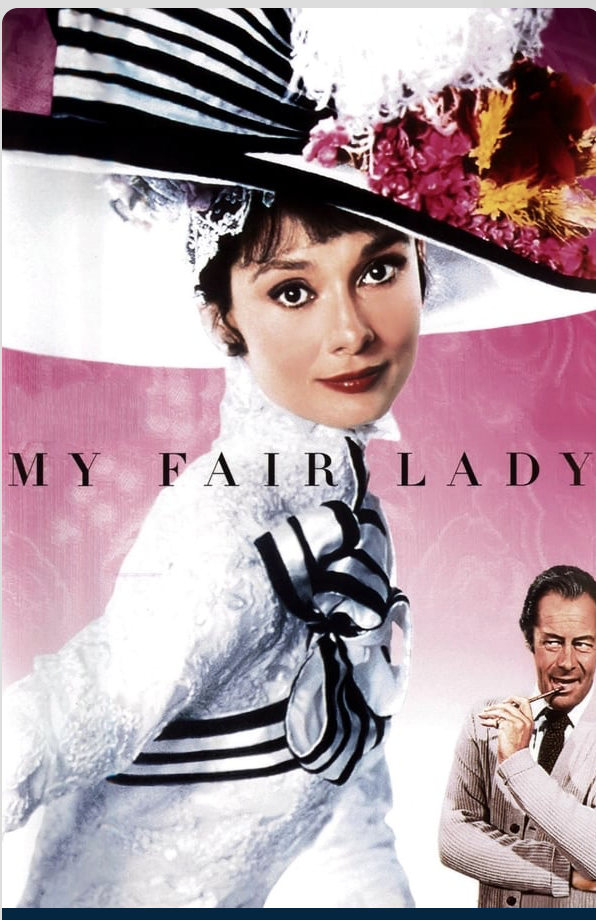My Fair Lady – The film, the Restoration, the Talk
At the Bedford Playhouse
Sunday, April 24, 12 pm
“My Fair Lady” – A Restoration Screening and
Discussion/audience Q & A with Janet Maslin and Robert Harris
Loverly! Renowned film restorer (and Bedford Playhouse board member) Robert Harris presents the restoration of the classic “My Fair Lady,” winner of the 1964 Academy Award for Best Picture, starring Rex Harrison and Audrey Hepburn. The film is presented in its original format with an intermission. Following the screening Janet Maslin, former chief film critic for the New York Times, will join Bob to discuss the film and restoration process as part of the Q and A session that follows the film.
“My Fair Lady” is based on the classic Pygmalion story by George Bernard Shaw. Apart from the sheer wonder of the writing and music, “My Fair Lady” is a real triumph – unforgettable music and gorgeous images. “Pygmalion” was a socialist attack on the British class system, here embodied by the character Henry Higgins, an upper-class linguist, who engineers flower girl Eliza Doolittle’s escape from the lower classes, and upends the snobbish belief that an Englishman’s destiny was largely determined by his accent (!) and that “superiority” was inherited, not earned. Bob Harris, who restored “My Fair Lady” in 1993, says that this was apparently the first musical to use any form of live recording of the music, “although only of Mr. Harrison, who refused to mouth to playbacks. His early model wireless microphone can be seen as a rather inflated tie during his musical numbers.” Harrison’s lips are therefore always in perfect sync, as opposed to everyone else’s in the film.
Why is film restoration so critical? By preserving film, we save history. During the 1980s, it became apparent that the collections of motion picture heritage were at risk of becoming lost. Created on perishable plastic, film decays within a few years if it is not properly restored. By rescuing decaying film stock, we preserve the wonderful images they contain, so the film can be shared with the public. It is estimated that 90 percent of all American silent films made before 1920, and 50 percent of American sound film made before 1950 had been lost. In 1980, UNESCO officially recognized “moving images” as an integral part of the world’s cultural heritage. According to Bob Harris, the greatest threat to film, however, was intentional destruction. “Most of the early films did not survive because of wholesale junking by the studios. There was no thought of ever saving these films. They simply needed vault space and the materials were expensive to house.” The cause for film preservation came to the forefront in the 1980s and early 1990s when influential film directors Steven Spielberg and Martin Scorsese got involved. Scorsese created The Film Foundation, a non-profit organization dedicated to film preservation, in 1990. By working in partnership with the leading film archives and studios, The Film Foundation has saved nearly 600 films, often restoring them to pristine condition.
Janet Maslin is an American journalist, best known as a film and literary critic for The New York Times.[1] She served as a Times film critic from 1977 to 1999 and as a book critic from 2000 to 2015. She began her career as a rock music critic for The Boston Phoenix and became a film editor and critic for them. She also worked as a freelancer for Rolling Stone and worked at Newsweek.[5]
Maslin became a film critic for The New York Times in 1977. From December 1, 1994, she replaced Vincent Canby as the chief film critic.[5] She continued to review films for The Times until 1999. Her film-criticism career, including her embrace of American independent cinema, is discussed in the documentary For the Love of Movies: The Story of American Film Criticism (2009). In the documentary, Entertainment Weekly critic Lisa Schwarzbaum recalls the excitement of having a woman as the lead reviewer at The New York Times. From 1994 to 2003, Maslin was a frequent guest on Charlie Rose where she shared her insights on current films and predicted who and what would capture an Academy Award. Maslin continues to review books for The New York Times.

About Bedford Playhouse
After a near $6m renovation, The Bedford Playhouse, home of the Clive Davis Arts Center, will host its Grand Opening on the weekend of September 28th! The festivities will include a three-day mix of “community choice” screenings, parties and family events, including a Saturday night Grand Opening celebration with surprises from friends and top donors! The two new small theaters will be revealed — as will the new Playhouse Cafe! Tickets and details on our website. Our mission is to provide a vibrant, state of the art cinema, cultural center and community hub, featuring outstanding films, other arts-related programming, educational offerings and a fun, welcoming space to relax and socialize.

